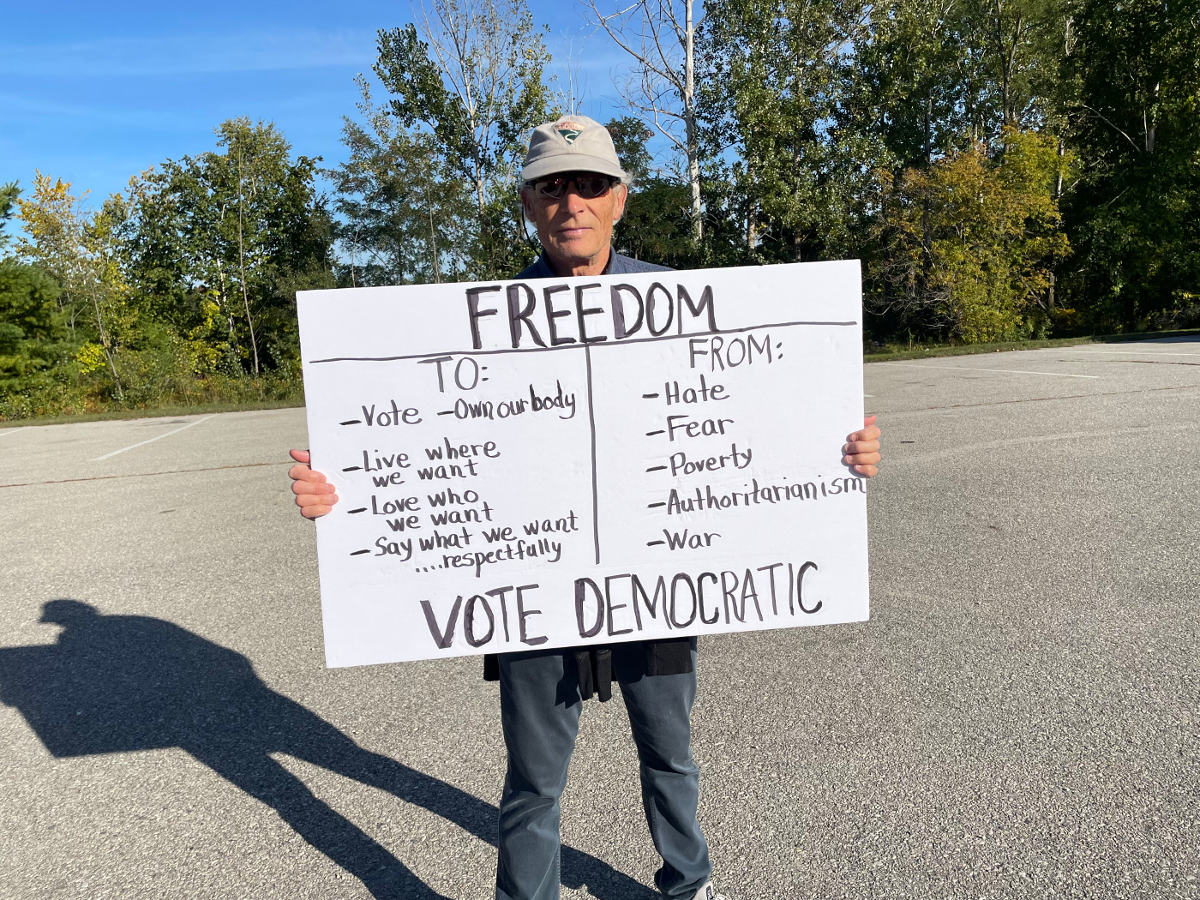“We choose to go to the Moon in this decade and do the other things, not because they are easy, but because they are hard, because that goal will serve to organize and measure the best of our energies and skills, because that challenge is one that we are willing to accept, one we are unwilling to postpone.”
This upcoming, mid-term election is a battle of narratives – in many ways, a battle between facts and fictions. There is no easy way to win this battle. It will be hard, but we will need to do what we can to organize our energies and skills.
What makes it so hard to sell a fact-based narrative is the inclination of many voters to make one-value decisions, to lack the time or interest to dive deeply into the causes of issues vs. the symptoms, and to react to messages vs. creating new solutions for changing conditions. Let’s unpack of each of those inclinations:
One-Value Decisions: Most decisions in our life involve more than one value, yet many people make decisions on one or a few. Purchasing a car in one example. Buying a car based on one value, e.g. tires, sound system, color, engine size, fuel efficiency, etc., can result in a terrible decision. The truth is that an investment this large should involve multiple values and deep exploration of what’s most important. Another example is buying a house. Most house purchases are based on a few key values, e.g. kitchen, bath, carpet color, location, etc. It’s so much easier to make one-value decisions than to go through all the work of identifying all the values involved, weighing what’s most important, and comparing alternatives to see which one satisfies the most values. This phenomenon is also true for how we choose our elected officials. Many political decisions are based on appearance, tax policy, regulation or any number of pet issues that drive voters to one politician or another. Making smart decisions, based on multiple values and well-founded facts, in every area of our life is hard to do. And yet, that’s what we need to do.
Lack of time or interest: Most of our lives are full. There are many demands on our time. We have so many distractions to deal with, e.g. sports or screens can dominate our lives. With our plates overflowing, It’s so much easier to focus on symptoms instead of digging deeply for underlying causes. Given all the pressures in our lives, it is not surprising that few of us do the research to discover the facts relative to our stated values and most important issues. Even if we base decisions on multiple values, many of us don’t do the rigorous work required to determine how each option satisfies all those values because it’s hard. And yet, that’s what we need to do.
Reaction vs. Creation: Just surviving can sometimes be as much as we can handle. Life can be heavy and fraught. There are so many events in our lives that trigger an emotional response. One would think that the four issues of climate change, pandemics, wars and extremism would be enough to make us all feel anxious, depressed, enraged and disoriented and to react to problems in ways that don’t reflect who we really are – or maybe they do. On top of the big 4, however, we are embroiled in cultural battles around religion, immigration, inflation, racism, education etc. all of which elicit polarized reactions in the public domain. It seems a bit much to expect that we can refrain from reacting to “breaking news” and continuously generate new solutions for constantly changing challenges based on multiple values and rigorous research. It’s so much easier to rant about negative feelings and imagined demons than to remain calm enough to generate innovative solutions. And yet, that’s what we need to do.
Politicians play on all of those factors when they are trying to win elections. When those three inclinations and conditions are in-play (one value, few facts, fueled by feelings), it becomes easier for politicians to manipulate emotions to get votes. The problem is that many people feel so strongly about a particular value (whether it is abortion, gun-rights, immigration, government activism, state rights, military solutions, religious rights, or civil rights) that a politician merely needs to tap into that one value to get their vote. For those voters who fiercely hold a particular value AND who are not deeply informed AND tend to react to hyperbolic messaging, it’s all too easy to sway them with conspiracy theories and lies.
To me, we are seeing all this play out in the upcoming election. Primarily, however, at its existential core, this election is about freedom. The problem is that there are two strong narratives about freedom. The best analysis of freedom I have ever read is On Freedom by Maggie Nelson. I summarized some of her thinking in a post related to the Republican platform, “What the ‘R’ in Republican Really Represents.”
In that post, I not only laid out some of the one-value decisions that republicans seem to be making, but also some of the strategies democrats would need to employ in order to win.
In short, I believe the differences in narratives can be summarized below:
Republicans want the freedom to expand:
- Gun rights
- Drilling, mining and extraction rights
- Corporate repression and exploitation of workers
- Individual rights not to participate in public health mandates
- Parent rights to ban books
- State rights to suppress voting
- White, male supremacy
- Hate speech
- Military budgets
- Imposition of religious beliefs
And the freedom to restrict:
- Women’s reproductive choices
- Corporate regulation
- Government taxation and services
- Literary choices
- Gender choices
- Sexual preferences
- Voting access
- Civil rights
- Immigration
- Child care, health care, elder care
Democrats want the freedom to expand:
- Women’s reproductive choices
- Corporate regulation
- Worker rights
- Environmental regulation and rewards
- Government taxation and services
- Federal Government right to legislate
- Literary choices
- Gender choices
- Sexual preferences
- Voting access
- Civil rights
- Immigration
- Child care, health care, elder care
And the freedom to restrict:
- Gun rights
- Drilling, mining and extraction rights
- Corporate repression and exploitation of workers
- Individual rights not to participate in public health mandates
- White, male Christian supremacy
- Imposition of religious beliefs
- Hate speech
Which narrative gets the most buy-in will determine the future of our democracy. We need to do what we can to win this election, not because freedom is easy, but because it is hard. We need to resist making one-value decisions not because it is easy but because it is hard. We need to do the research to be fully informed not because it is easy but because it is hard. We need to generate creative responses for rapidly changing conditions not because it is easy but because it is hard.
The only way to preserve the freedoms we cherish is to outwork the opposition. That means voting, registering others to vote, getting out the vote, running for local offices, etc. It will be hard, but if we don’t do the work we can forget about going to the moon and reserve a space instead to the first ship to Mars. As JFK implored us, we need to organize the best of our energies and skills.
In that regard, I propose we all develop posters of our own choosing which state clearly our narrative on freedom and promote that narrative as broadly as possible. Here’s mine:
Freedom from:
- Hate
- Fear
- Poverty
- Authoritarianism
- War
Freedom to:
- Vote
- Own our bodies
- Live where we want
- Love who we want
- Say what we want respectfully
With hard work, we can win this election. May it be so.
Also published on Medium.


